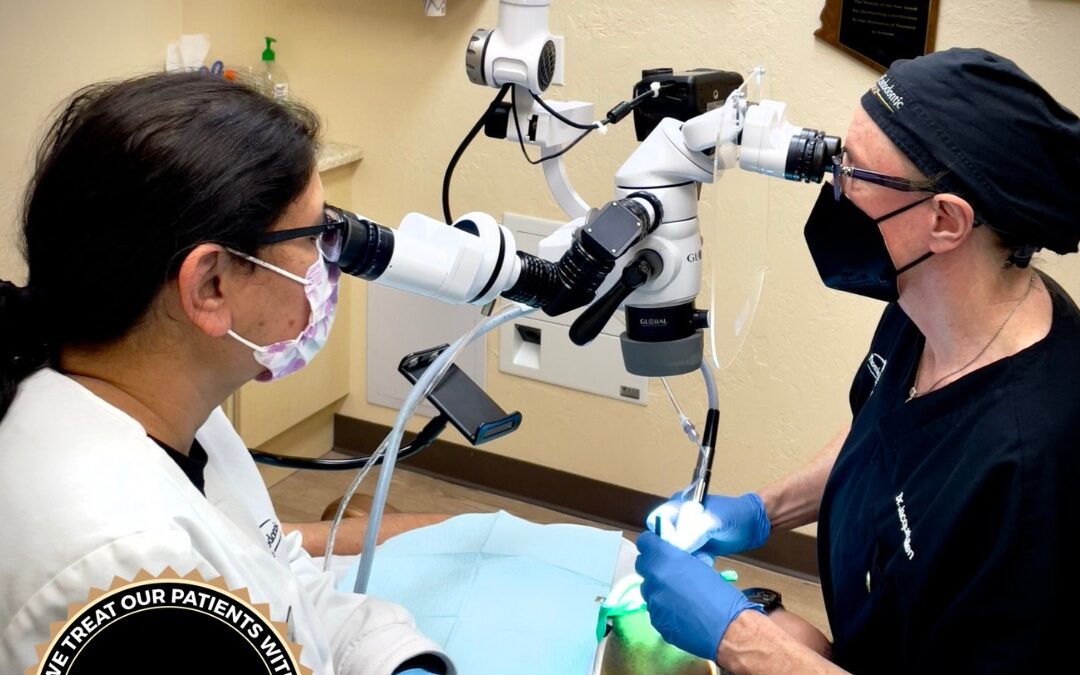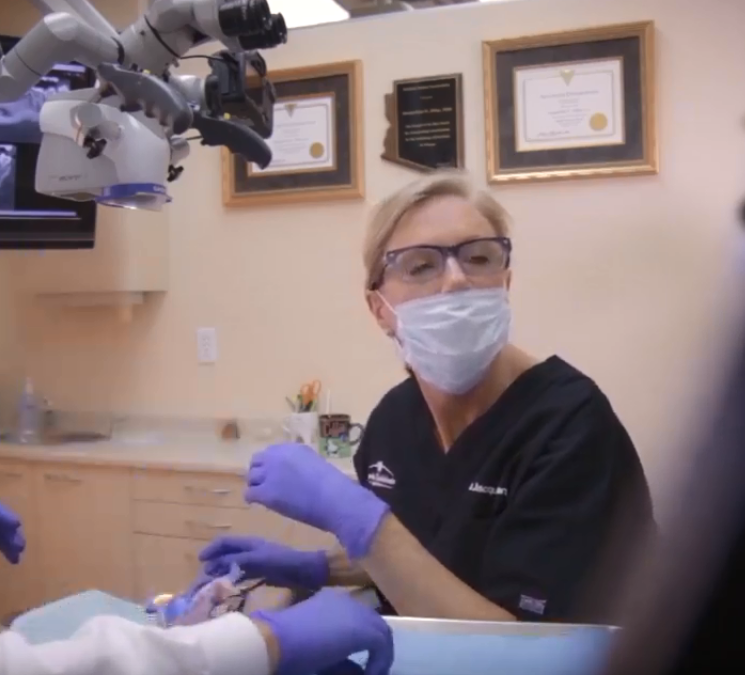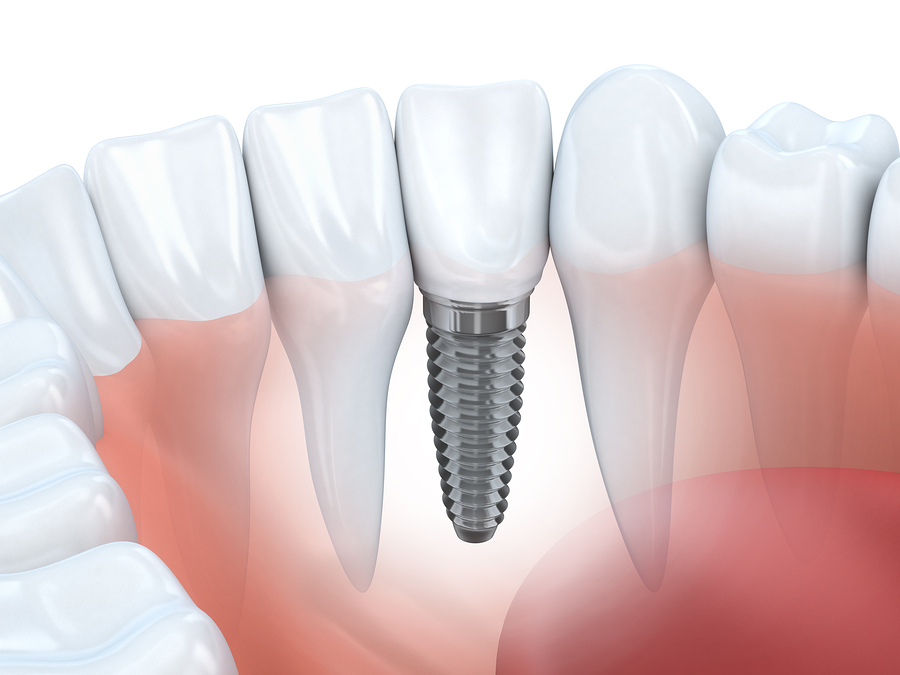by Dr. Jacqueline S. Allen | Jul 15, 2019 | Blog, Endodontics, Phoenix Endodontic Group, Root Canal
If you are referred to an endodontist for a root canal, you may be surprised to learn that, as critical as the procedure is to saving your natural tooth, you will also need a second procedure to ensure its long-term success. Most of the time, your endodontist will recommend placing a crown on the tooth with the root canal. To understand why, it is helpful to review what root canal treatments do and the after-care needed to support them.
Why Teeth Treated With Root Canals Need Crowns
- A root canal replaces your tooth’s nerve pulp with a biocompatible material. This substitution of gutta-percha or another biocompatible substance is what makes it possible to save your tooth, but it also makes the tooth more brittle. This means it can be more vulnerable to chipping or cracking.
- The infection or breakage that led to the need for a root canal may have permanently weakened the tooth. By the time a root canal is recommended, your tooth may have already sustained structural damage. A crown can cover your entire tooth above the root line and provide protection your natural tooth has lost.
- Previous dental work may have weakened your tooth. Dental fillings can fail and leave teeth prone to decay. Teeth on either side of a bridge may have been altered to hold the restoration in place. Other types of dental work can also reduce the strength of your teeth.
- Crowns can prevent coronal leakage. If the filling that seals in the biocompatible tooth root material develops a leak, infection can get in and ruin the root canal. Crowns are the best restoration to prevent this type of potential damage.
“Root canals regularly save natural teeth, and a root canal topped with a crown can allow that tooth to last as long as the rest of your teeth,” says Dr. Allen, an endodontist with the Phoenix Endodontic Group. “Our practice is happy to explain the importance of each step of the root canal process.”

by Dr. Jacqueline S. Allen | May 28, 2019 | Blog, Endodontics, Endodontist, Phoenix Endodontic Group, Root Canal
Determining whether you need a root canal or another type of dental treatment is usually handled by your general dentist or endodontist. You can avoid many complications by knowing the signs and symptoms indicating a root canal may be needed, and making an appointment to have your tooth examined.
Signs You May Need A Root Canal

Root canals are often the treatment of choice when a tooth has become injured or infected at a level impacting your dental pulp – the part of your tooth beneath the enamel and dentin layers, made up of blood vessels, nerves, and connective tissue.
There are many ways this part of the tooth can be injured:
- A chip or crack in the tooth lets bacteria into the pulp, causing infection
- Severe, untreated tooth decay or cavities
- Trauma to the face resulting in damage to your tooth’s structure
Sometimes teeth needing root canals show few symptoms and require diagnosis through careful examination by a dental professional using radiographs or other imaging techniques. It’s often apparent, though, when something is wrong with your tooth. Some of the symptoms that may call for a root canal include:
- A severe toothache that gets worse when you chew or apply pressure near the tooth
- Swelling and tenderness of the gums near the tooth
- Discoloration (usually darkening) of the tooth
- The tooth is sensitive to hot or cold temperatures, and discomfort remains after the source of the temperature change is gone
- A pimple on the gums that persists or keeps reappearing
If you experience any of these symptoms, call your general dentist or endodontist immediately.
“Recognizing the signs of damaged or infected teeth can save patients extra discomfort and ensure their root canal treatment begins early,” says Dr. Allen, an endodontist who practices with the Phoenix Endodontic Group.

by Dr. Jacqueline S. Allen | Mar 25, 2019 | Blog, Dental Implants, Phoenix Endodontic Group
When teeth are injured, infected, or structurally damaged, it can be challenging to determine the best path back to oral health. Sometimes endodontists can save natural teeth with root canals. When teeth are beyond saving, dental implants are an option. Implants are safe, remain securely in your mouth 24/7, and help prevent further jawbone loss. Properly cared for dental implants can last many years.

What The Research Says About Dental Implant Longevity
- Dental implants have been used reliably for more than 50 years. Implants are recognized as more effective than many types of bridgework.
- Root canal treatments and dental implants have similar levels of durability. Both restorations have a success rate of about 95 percent over post-implant periods as long as 16 years.
- Pre-implant oral health and post-implant oral care impact dental implant longevity. The best candidates for implants have healthy gums and enough jawbone density for support. Heavy smokers or patients with systemic conditions like diabetes must be evaluated for implants on a case-by-case basis. Following dental implant surgery, caring for the implant like a natural tooth is critical to ensuring its long-term endurance.
- Teeth grinding threatens dental implant success. The forces involved in grinding (bruxism) can damage the implant. Patients with bruxism who use a night guard or take other steps to control their teeth grinding can expect a better success rate.
“The choice to get dental implants should rest on the health of the teeth in question, the health of the patient, and their commitment to post-procedure upkeep,” says Dr. Jacqueline S. Allen, who practices with the Phoenix Endodontic Group. “Like root canals, the procedure has a high success rate under the right conditions.”

by Dr. Jacqueline S. Allen | Nov 28, 2018 | Blog, Dental Implants, Dentistry, Endodontist, Phoenix Endodontic Group
 Dental patients with teeth that are seriously compromised by illness, injury, or decay are usually aware that extraction by itself is rarely the best option. If you are experiencing serious tooth trouble, you may be wondering whether a root canal or a dental implant would be the better solution.
Dental patients with teeth that are seriously compromised by illness, injury, or decay are usually aware that extraction by itself is rarely the best option. If you are experiencing serious tooth trouble, you may be wondering whether a root canal or a dental implant would be the better solution.
At Phoenix Endodontic Group, our practice is dedicated to saving natural teeth through root canal treatments and related procedures. However, there are times when a tooth simply cannot be saved through endodontic treatment. When that is the case, our practice may recommend a dental implant for the patient.
Who Is A Good Candidate For A Dental Implant?
- A patient who has a lower level of dental anxiety or phobia. Tooth extraction and implant surgery are more complex procedures than root canal treatment. If anxiety issues do exist, they should be discussed during preparation for the implant. We can develop a care plan for patients experiencing dental anxiety.
- A patient with strong periodontal (gum) health. By the time the “root canal or dental implant” crossroads has been reached, many patients already are struggling with advanced gum disease, but the healthier the gums are, the greater the likelihood the procedure will go smoothly.
- A patient who has not experienced significant bone loss in the jaw. Bone grafts can be done to strengthen a jaw before it receives an implant, but this may result in an additional procedure.
- A patient who can commit to a lengthy implantation/recovery process. Traditional dental implants require several months to complete. The portion of the implant inserted into the jaw must be allowed to integrate with the bone before placement of an artificial tooth is possible.
“Dental implants and root canals both have high levels of success and patient satisfaction,” says Dr. Jacqueline S. Allen, an endodontist who practices with the Phoenix Endodontic Group. “Your dental team can determine which treatment route is better for your individual circumstances.”

by Dr. Jacqueline S. Allen | Oct 22, 2018 | Blog, Endodontics, Endodontist, Phoenix Endodontic Group, Root Canal
Your experience after a root canal may be as unique as the circumstances that led to your need for the procedure. After your root canal, your endodontist will likely send you home with instructions for how to care for your teeth until a permanent crown can be placed. These instructions might cover pain management, brushing and flossing, and tips for retaining your temporary crown.
One of the post-procedural questions that may be at the top of your mind is when you can go back to work. The simple answer is usually, “the day after your procedure.” However, several factors can influence this time estimate.
 3 Post-Root Canal Questions To Answer Before You Return To Work
3 Post-Root Canal Questions To Answer Before You Return To Work
- How much post-procedure pain are you experiencing? You may experience discomfort after the root canal, but often it can be managed with over-the-counter painkillers. Serious pain can indicate that you may need to follow up with your endodontist.
- Is your temporary crown still in place? You will need to have the crown replaced if it falls out.
- Does your work situation allow you to control what you eat? You’ll want to eat soft, cool, bland foods and chew on the side of the mouth opposite the root canal.
“Most adults can go back to work within a day of their root canal,” says Dr. Allen an endodontist who practices with the Phoenix Endodontic Group, “However, it’s crucial not to rush that return so much that you miss a symptom your endodontist needs to know about.”
by Dr. Jacqueline S. Allen | Sep 25, 2018 | Blog, Endodontics, Endodontist, Phoenix Endodontic Group, Root Canal
Modern root canals are very effective treatments for natural teeth endangered by injury, decay or disease. The procedure has a success rate well above 90 percent. In those first few days after a root canal, though, your attention may be drawn to more immediate concerns, including what to eat as your mouth heals.
How you eat and what you eat are two key pieces of your root canal aftercare. Following the guidelines below can help ensure your recovery goes smoothly.
Foods To Avoid After Your Root Canal
- Raw vegetables. Normally health enhancing, crunchy snacks such as carrots and celery should be temporarily taken off your menu.
- Nuts. Again, this category of food is usually on the health friendly list, but they are simply too hard for your newly treated tooth to handle.
- Hard candy. Even if your intention is to suck on these sweet treats instead of chew them, there is always the risk that the candy could shatter or put too much pressure on the treated area.
- Chewing gum. The main danger of using chewing gum after a root canal is that it could pull out your temporary filling, which is essential to preventing infection until a permanent crown can be placed.
- Excessively hot foods or drinks. Items such as hot coffee, soup or tea may cause painful sensitivity during the healing period.
Foods that are generally safe to eat after a root canal include ice cream, soft fruits such as bananas and mangoes, yogurt, milkshakes, oatmeal and soft cereals free of any nuts. It is also very important to chew on the side of the mouth opposite your tooth receiving root canal treatment, and to eat slowly.
“The healing period for a root canal is not especially lengthy, but it is important to eat with care during that time to avoid damaging the work your endodontist has done,” says Dr. Allen, who practices with the Phoenix Endodontic Group.






